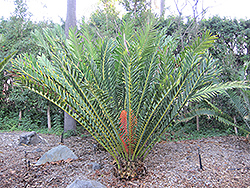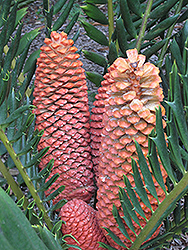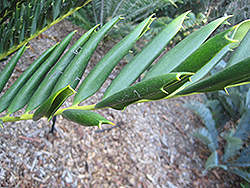It's all about ...
plants

Height: 8 feet
Spread: 15 feet
Sunlight:
![]()
![]()
Hardiness Zone: 9b
Other Names: East African Sago Palm
Description:
A vigorous, easy to grow, medium to large sized cycad with long, green leaves that emerge upright, then relax outward; develops a stout trunk over a long period; needs sun protection in hot desert areas; water tolerant, but must be well drained
Ornamental Features
Mombasa Cycad is primarily grown for its highly ornamental fruit. The orange fruits with red overtones and which fade to coppery-bronze over time are held in abundance in spectacular cones from early spring to mid fall. It has attractive bluish-green foliage with hints of steel blue. The large spiny narrow pinnately compound leaves are highly ornamental and remain bluish-green throughout the winter. The rough bark and brown branches add an interesting dimension to the landscape.
Landscape Attributes
Mombasa Cycad is a spreading evergreen shrub with a shapely form and gracefully arching branches. Its relatively fine texture sets it apart from other landscape plants with less refined foliage.
This is a relatively low maintenance shrub, and should never be pruned except to remove any dieback, as it tends not to take pruning well. Gardeners should be aware of the following characteristic(s) that may warrant special consideration;
- Spiny
Mombasa Cycad is recommended for the following landscape applications;
- Accent
- Rock/Alpine Gardens
- General Garden Use
- Container Planting
Planting & Growing
Mombasa Cycad will grow to be about 8 feet tall at maturity, with a spread of 15 feet. It has a low canopy with a typical clearance of 2 feet from the ground, and is suitable for planting under power lines. It grows at a fast rate, and under ideal conditions can be expected to live to a ripe old age of 100 years or more; think of this as a heritage shrub for future generations! This is a dioecious species, meaning that individual plants are either male or female. Only the females will produce fruit, and a male variety of the same species is required nearby as a pollinator.
This shrub does best in full sun to partial shade. It does best in average to evenly moist conditions, but will not tolerate standing water. It is not particular as to soil pH, but grows best in sandy soils. It is quite intolerant of urban pollution, therefore inner city or urban streetside plantings are best avoided. This species is not originally from North America. It can be propagated by division.
Mombasa Cycad makes a fine choice for the outdoor landscape, but it is also well-suited for use in outdoor pots and containers. Because of its height, it is often used as a 'thriller' in the 'spiller-thriller-filler' container combination; plant it near the center of the pot, surrounded by smaller plants and those that spill over the edges. It is even sizeable enough that it can be grown alone in a suitable container. Note that when grown in a container, it may not perform exactly as indicated on the tag - this is to be expected. Also note that when growing plants in outdoor containers and baskets, they may require more frequent waterings than they would in the yard or garden. Be aware that in our climate, most plants cannot be expected to survive the winter if left in containers outdoors, and this plant is no exception. Contact our experts for more information on how to protect it over the winter months.
This plant is not reliably hardy in our region, and certain restrictions may apply; contact the store for more information.


